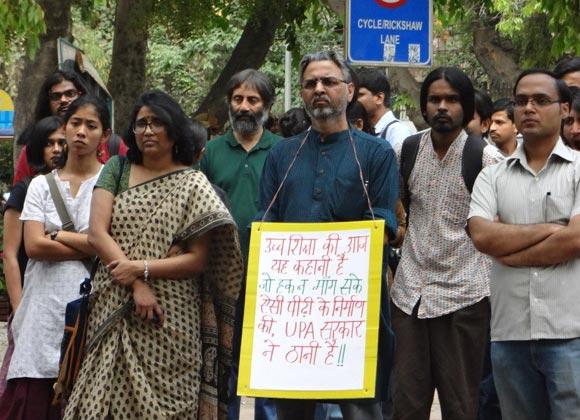
As the Delhi University's Four Year Undergraduate Programme once again gets embroiled in a raging battle -- whether to scrap it or not -- between the University Grants Commission and Delhi University, we reproduce this article, first published on April 23, 2013, that makes a strong case for scrapping the DU's FYUP.
Prof Saikat Ghosh, Department of English, SGBT Khalsa College, Delhi tells Divya Nair why vice chancellor Dinesh Singh must RECONSIDER implementing the Delhi University's four-year undergraduate programme in its current form and explains how the politically motivated decision will inconvenience students as opposed to benefiting them.
First and foremost, the Delhi University's Four Year Undergraduate Programme(FYUP) which will be implemented July 2013 onwards is clearly a dream project of the United Progressive Alliance.
It has been formulated in such a way that it will be in sync with the American system of education so that American universities can come and set shops in India.
MUST READ: All you need to know about DU's Four Year UG programme
The former minister of Human Resource Development Kapil Sibal had made annoucements about improving the Indian higher education system jointly with the US secretary of state Hillary Clinton at the first ever Indo-US Education Summit held at Washington DC in October 2011.
The current Vice Chancellor of the Delhi University Dinesh Singh is UPA's blue-eyed boy and Kapil Sibal's protege.
Dinesh Singh knows that he doesn't have to take responsibility for what happens to the Delhi University 10 or 15 years down the line. He is just looking at a short term immediate strategy.
If he is going to implement it given the amount of opposition, I am sure he will be given a plum post in the coming years. But the VC is putting everything that is good about the Delhi University at stake to suit his personal needs.
The FYUP is nothing but a personal and purely selfish decision.
Let's take a look at the three-fold aim of the Four Year Undergraduate Programme.
1. It promises to bring an interdisciplinary approach to education
2. It will give the student more options to specialise in and
3. It will help improve employability skills.
Allow me to analyse these promises one by one.
Please click NEXT to continue reading...
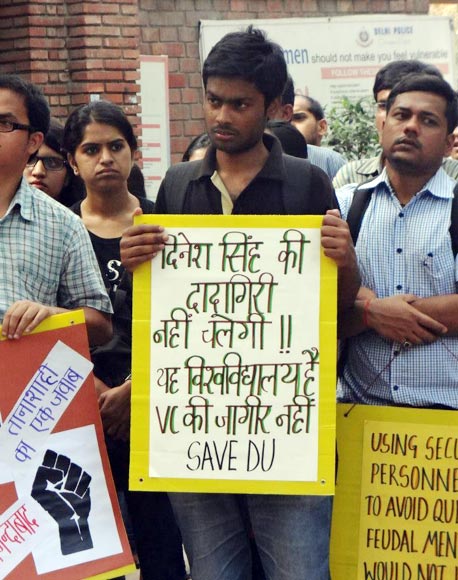
The VC wants to introduce interdisciplinary courses in higher education.
Aren't the students at the DU already pursuing both concurrent and interdisciplinary courses which are relevant to their subject? Why has it suddenly lost relevance?
For the FYUP, the VC and his task force has recommended 11 foundation courses (FC) which seem to provide an interdisciplinary content. Let me elaborate what the problem here is.
Students who will be entering the first year must have already specialised in a particular stream in their Class 11 and 12.
If you look at the subjects offered under the foundation course (geography, history, psychology to name a few), you will realise that these are general subjects that are already taught at the Class 10 level.
In the FYUP, students in their first year will mostly be revising what they have already learnt which we believe is an utter waste of time and can be done away with.
We are also worried about the completely unnatural haste with which these courses have been asked to design by teachers who are mostly being forced into doing the same.
By now, most of you are aware that most teachers who have some understanding of what the new system entails stand opposed to the idea.
And if we have to go ahead with the new pattern, since most senior professors are out on strike, may I ask the VC, who are these professors who will be working with you to formulate the courses?
What is their credibility?
Do they have any research knowledge? Are they equipped to design courses or are they just filling in somebody else's shoes?
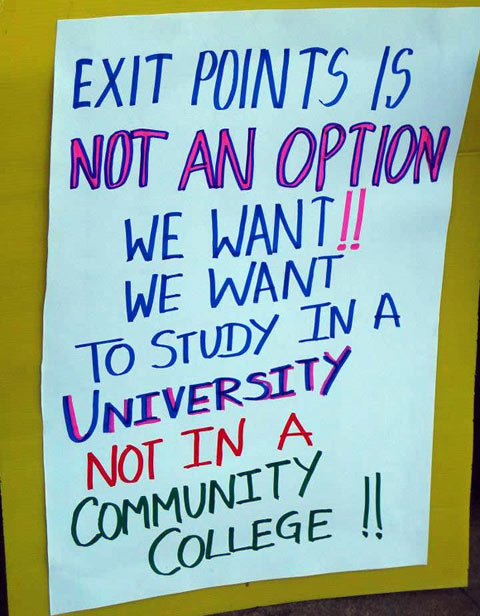
Next we come to the options part.
The VC maintains that the four year programme will give students plenty of options to choose from.
Do you even know what the new interdisciplinary options are?
A student of Physics can choose English as a second subject. I would like to know how are these two subjects related?
Why and how would the combination of Chemistry and Political Science benefit a student at the graduation level?
Although it sounds like a new breakthrough in education, practically speaking, the argument holds no water.
Such education will be of no use to the student who will have to choose between two options that will be of no use to his/her field of interest.
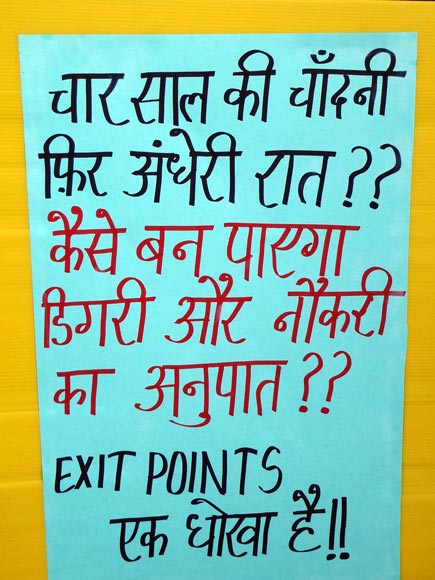
And last but not the least the VC is playing the employability card.
Everyone is suddenly claiming that university graduates are not employable.
Do we have any concrete data to establish that the three-year structure of the Delhi University is to be blamed for the lack of employability in general?
I personally believe that students of the Delhi University do not face difficulty finding employment.
Without the interference of the college or university, a good number of students have been able to find jobs.
Also, I personally feel that it would be wrong to refer to the NASSCOM report and draw conclusions about the ability of our graduates.
The reason I'm saying this is because the NASSCOM (not to forget a BPO conglomerate) findings point out that lack of English skills is a prime reason why graduates are not finding employment.
If the Delhi University is not good enough how is it that so many students from our university win scholarships and are invited to study at the Cambridge, Oxford and Harvard each year?
In fact the Delhi University is recognised for its English language programmes and very recently, it was ranked among the very few universities from India to have topped the QS rankings.
The NASSCOM which is a BPO conglomerate insists that our graduates are not employable.
But English pronunciation, UK culture training, accent training and etiquette training are BPO skills and used to be a huge business until 10 years ago.
Now, with the downfall in the BPO industry, the numerous skill training institutes have taken a beating and the NASSCOM is hitting hard on universities to make these skills compulsory so that these private training institutes can make some profit out of it.
Why is the VC hell bent on instilling BPO skills in students? Are we training our students for call centre jobs? If not, why can't we instead give them broad skills and design our curriculum such?
Do we have to compromise on our curriculum in order to bend backwards in order to accommodate the BPO inclined training centres just because NASSCOM wants it?
I do agree that there is the need to train students from poor backgrounds in language skills, but that can be done in a much refined way than merely having it as a subject at the graduate level for which even the curricula is not defined.
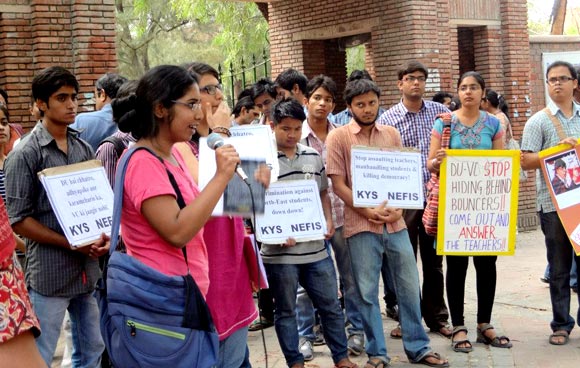
A few years ago, the Delhi University moved to the semester format. Students are still reeling from its after effects.
The VC is further claiming that the new system will focus on less study hours.
He has already said that according to the new format, the teaching time will be reduced to three months or 12 weeks.
On one hand you are saying that the courses will add professional value, on the other hand you are giving both us and the student only 12 weeks to prepare.
How do you expect the student to have an in-depth understanding of the course in 12 weeks by spending an average of three to four hours per week?
In the semester format, the student is spending more time preparing for exams and completing projects than attending lectures.
Every year, even the teachers spend an average of three months only preparing and evaluating question papers.
How then can you expect the student to master the course at the end of his/her graduation?
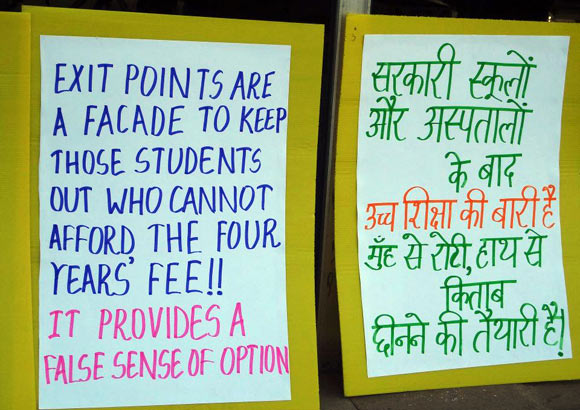
The vice chancellor has categorically said that no additional infrastructure will be provided and no new teaching posts will be created towards implementing the Four Year Undergraduate Programme.
The number of students keep increasing but infrastructure remains the same.
With one more year adding up, how are we going to cope with no new teachers or classrooms?
I don't know how science can be taught with lesser number of practical classes.
Even teachers know that they will not be able to give appropriate personal attention thus diminishing the purpose.
Also, the Delhi University is not a residential university like the Jawaharlal Nehru University.
Most students who come to study are from nearby towns like Faridabad and most of them face financial challenges.
The increase in annual fee has always been an issue with both parents and students from underprivileged families.
They are currently paying an average of Rs 15,000 per year.
With the addition of one more year, parents are worried about the increase in the annual cost of education.
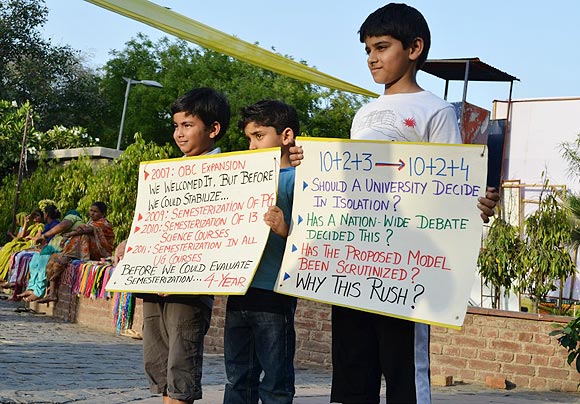
I would suggest that the VC considers dropping the F in the FYUP and brings back the old annual format which was simpler and emphasised on conceptual clarity.
A three-year programme with rational choices is good enough at the undergraduate level.
For the interdisciplinary courses, let each department have the liberty to design its own optional courses.
A student of literature at the undergraduate level can be asked to choose between political science, economics or history, but not physics or chemistry.
To make our students employment ready, we must offer remedial teaching through language and communication laboratories and not force them into BPO or IT training.
Also, it would be unfair to do it with the existing workforce and infrastructure.
Since there is no empirical data that our existing system is foiled, there is no hurry to implement the new programme ad hoc which has not received the consent of both senior faculty members and students.
We will be fighting tooth and nail to get our voices heard and protect the Delhi University.
If at all, the vice chancellor ignores it all and chooses to go ahead with the four year programme as is, we are sure that the Delhi University will become a laughing stock in the years to follow.